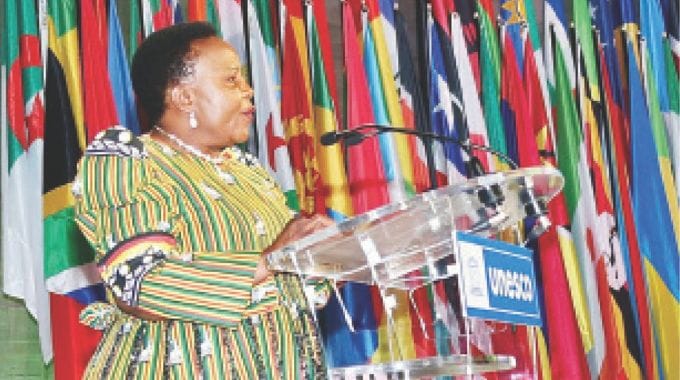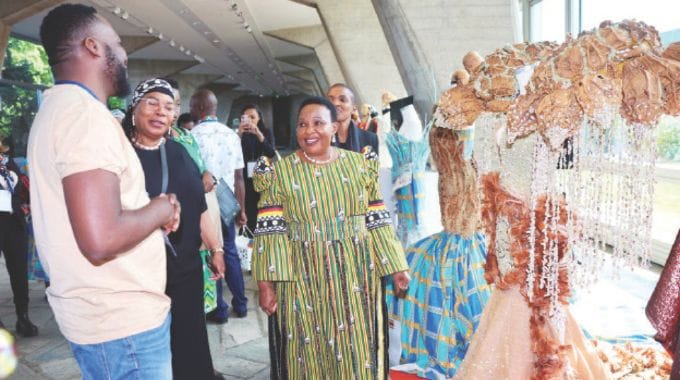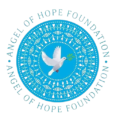First Lady gets standing ovation at Africa Week in Paris
Tendai Rupapa in PARIS, France
In a momentous occasion at the UNESCO Headquarters in Paris, France, First Lady Dr Auxillia Mnangagwa was greeted with royal accolades from over 40 African ambassadors.
As the patron of culture and heritage, she has been celebrated for her unwavering commitment to uplifting the continent’s citizenry.
Dr Mnangagwa’s presence at Africa Week, part of the Culture Month celebrations, underscores her pivotal role in promoting and preserving African culture and heritage, marking a significant step forward in the continent’s cultural journey.
She is there at the invitation of UNESCO as guest of honour in recognition of her efforts in the promotion and preservation of culture and heritage in Africa.
Dr Mnangagwa received a standing ovation after delivering what delegates described as a powerful speech that resonated with the aspirations of Africa.
Resplendent in a long custom-made dress adorned with the Zimbabwe bird sewn from Zimbabwe’s national fabric, Dr Mnangagwa was described as the pride of Africa, an advocate for the preservation of the continent’s cultural heritage.
Most of the delegates sought to have selfies with her as she walked out of the auditorium, a testament to how her life-changing, culturally grounded programmes have captured the imagination of the world.
In her remarks at the colourful event, the First Lady said it was essential to celebrate Africa’s achievements and to reflect on “our different circumstances and to leverage on our opportunities as well as proffer solutions to our common challenges of different countries in the world”.
“Today we gather under a powerful and urgent theme ‘Global solidarity for the restitution and restoration of African heritage through education, science and culture’. This theme not only calls upon the moral consciousness of the global community, but it challenges us to re-examine the frameworks through which history has been preserved, interpreted and many times distorted.
“The urgency to act is not only political but deeply human. It speaks to our collective responsibility to repair and rebuild what was broken for the sake of human progress,” she said to applause.

The theme, Dr Mnangagwa said, resonated deeply, not only with Africa’s past, but with its future.
“Your Excellencies, distinguished guests, today I am addressing you from the point of view of an African woman, a mother and an advocate for the preservation of our cultural heritage for a better future.
“I am truly convinced that Africa’s cultural heritage is not just a collection of artefacts or traditions; it is the living spirit of our people. It holds the wisdom of generations, the resilience of our ancestors and the vision for our shared tomorrow.
“It is through culture that we tell our stories, heal our communities and build sustainable futures through music, dance, oral traditions and storytelling. Our ancestors passed on not only knowledge, but values, ethics and the blueprints of harmony.
“Each cultural practice, no matter how small, serves as a vessel of intergenerational wisdom. In the words of the Akhan people of Ghana, ‘wisdom is like a baobab tree, no one individual can embrace it’.
“This proverb teaches us that our cultural heritage is a collective inheritance meant to be shared, upheld and passed on together,” she said.
In her work with the youth, education and empowerment of girls and women, Dr Mnangagwa said she had seen first-hand that when people nurture cultural identity, they cultivate leadership, innovation and hope.
Preserving and restoring heritage, she said, was not about looking backward; it was about equipping young people with the tools they need to address these challenges today and in the future.
“The Yoruba say, I quote: ‘A child who is not embraced by the village will burn it down to feel its warmth.’ This highlights the urgency of empowering our youth so they feel valued, heard, and equipped to shape the future rather than being alienated from it.
“Climate change, food insecurity, early pregnancies and marriages, and substance abuse are not distant problems; they are realities that undermine societies and threaten the dreams of millions of young people, especially in our continent Africa.
“Within our indigenous knowledge systems lie the solutions we seek. In my quest to find solutions in Zimbabwe, I have gone back to the village to work with the chiefs and elders who are the custodians of indigenous knowledge systems to retrace the good cultural education systems that once held society together.
“For your information, this knowledge and wisdom had been thrown away and replaced by modern education systems which lack the community touch hence together with the elders we are reintroducing good practices such as the Nhanga/Gota/Ixhiba sessions for boys and girls between the ages of 10 and 13 where they are taught life skills for them to grow up into well-mannered and responsible citizens as well as revert to traditional food and nutrition by which our forefathers lived healthy and long lives,” she said.

A firm believer in culture and African tradition, Dr Mnangagwa said some of the solutions to challenges being faced today lay in indigenous knowledge systems.
“Your Excellencies, ladies and gentlemen, as we face global challenges, we need to dig deep into our cultural archives, revisit our indigenous knowledge systems, our culture, and draw from our fountains of wisdom. These offer powerful solutions that the world urgently needs.
“In Zimbabwe, we have a saying that says, ‘until the lion tells his side of the story, the tale of the hunt will always glorify the hunter’. This is why restoring African voices through our heritage is not optional.
“It is essential for rewriting Africa’s narrative with truth and justice, for our voices to be heard without any reservations. Traditional agricultural practices passed down through generations teach us sustainable ways of living in harmony with the land,” she said.
Community structures and rites of passage, the First Lady said, offered young people guidance, purpose, and belonging, steering them away from destructive paths.
“The wisdom of our elders holds lessons on resilience, environmental stewardship, and social harmony that the world urgently needs to know. Just as in many African societies, including Zimbabwe, women have traditionally held key roles as guardians of indigenous knowledge, whether in agriculture, medicine, or conflict resolution in communities.
“Their contribution is not ancillary, but it is foundational. Programmes that uplift women and girls are not just social interventions, they are strategies of cultural survival. When a girl is educated and rooted in a culture, she becomes a pillar of strength, not just for her family, but for the entire community,” she said.
The mother of the nation said the empowerment of youths, women and girls was a priority.
“. . . it must be our priority in Africa to empower our girls, youth, and women as we endeavour to restore our stolen heritage and our values, let’s demonstrate by doing and by action. Restitution of any country’s history is about restoring its pride, dignity, and giving hope to generations who deserve to see themselves reflect in the mirror of it.
“Restitution is therefore not optional, but it is a moral imperative. Our African heritage is very rich and must be revitalised.
“This has opened a new horizon for us all here, our continent, Africa, to stand in true solidarity with each other and to invest in youth education that is rooted in our own country’s identities, protect indigenous knowledge systems, and to honour our women and girls who are the custodians of this practice.
“I therefore encourage our African nations to build cultural institutions, libraries, and museums in order to preserve and promote our heritage,” she said.
“I want to conclude with a Xhosa proverb which says, ‘the child who is not taught by the mother will be taught by the world’. So let us be the ones who teach our children through culture.”
Commenting on the First Lady’s speech and documentary detailing her works on culture and Heritage, Kenya’s permanent delegate to UNESCO Professor Peter Ngure spoke glowingly of the First Lady and the points she raised.
“I had the privilege to moderate the session where Her Excellency Dr Auxillia Mnangagwa presented to us one of the best speeches that I have heard of late. It was preceded by a video that was a clear testimony of the great work that she does back in Zimbabwe and beyond.
“Her speech was very stimulating because she was not just sharing knowledge, she was also sharing her experiences and it was punctuated by deep convictions that she has, especially for women and children, and the connection between that and our traditional knowledge systems.
“I was particularly enthused to realise how she humbles herself and goes down to the grassroots to meet the less privileged, to meet the elders and to humbly listen and be able to make sense of the deep wisdom that emanates from our elders,” he said.
Prof Ngure described Dr Mnangagwa as an icon who deserved to be elevated to Africa’s ambassador for culture.
“She is really an icon and very well deserving as the ambassador of culture in Zimbabwe. I wish we could elevate her to be the ambassador of culture for Africa because she lives by example.
“Her humility, her knowledge, her articulation of the points, and even the call for action that she left behind will remain in the minds of the African team and UNESCO in general. We are very grateful that she came all the way. Her coming to UNESCO is a great honour for us.
“This is a special week for the African group, and it was great to share with Zimbabwe. This was the most deserving, the most appropriate Excellency to share with us, and for that we are very grateful,” he said.
Ms Jeong Kim, the director of UNESCO’s division of Education, said the push for education systems that are inclusive and grounded culturally and explicitly recognise general history as a key reference, especially, of course, in the African continent.
“To support the role of this framework, we are now also developing a dedicated implementation policy guide that is aimed at policy makers and educators and this tool will help our countries to put these principles into action making sure the guidelines are adapted again to guide the local education systems, but there are also cultures and needs. We really believe education can be a pivot to help Africa’s societies, especially young people.
“Many of us have made reference to the youth and the importance of youth as said by the First Lady of Zimbabwe and its really up to the youth to claim, defend and re-imagine their heritage in their terms and this is what UNESCO has committed to supporting through research and facilitating knowledge exchange and to make sure that these efforts are also based on evidence and all best practices,” she said.
Mr Jean-Celestine Edjangue was equally awestruck by the First Lady’s initiatives.
“I was happy to listen to the First Lady of Zimbabwe Dr Auxillia Mnangagwa. She talked about history, culture, and the necessity to make the arts be seen and transmitted to the younger generations. I am happy the First Lady is engaging the traditional chiefs and the elderly in her initiatives because the elderly people pass on the knowledge and help the young,” he said. – Herald

